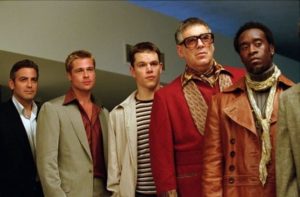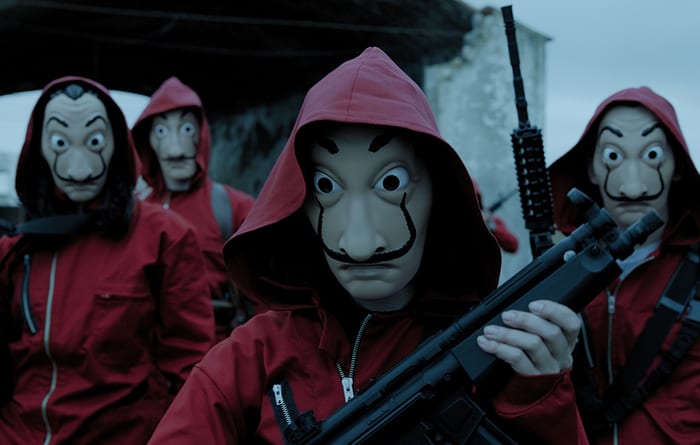How to Write a Heist Movie (or TV series): The ULTIMATE 10 Steps
A band of misfits. A slick elite group. “Getting away clean”. Whatever the stakes. A heist movie can provide writers with an instant shortcut to tension, drama and great action scenes.
It’s a staple of the thriller genre. The heist movie has been there since the dawn of cinema and continues to reinvent itself.
There are many different ways the heist movie can manifest. It’s not always just a simple case of robbing a bank. A group banded together to steal something without getting caught. This is the essential core of any heist movie, whatever the context.
Moreover, the global smash hit Money Heist shows the movies don’t have a monopoly on the heist narrative. Perhaps the door has been opened to a new genre of heist TV series.
We’re going to take a look at the 10 key steps in how to write a heist movie. What are the vital beats and tropes to follow? How have these been subverted?
We’ll primarily use five examples of heist narratives to help illustrate our points: Ocean’s Eleven, Inception, Money Heist, Dog Day Afternoon & Hustlers.
This isn’t a guide simply on how to write a heist movie, but how to write a heist narrative.
Of course there are exceptions to the rules and heist narratives that subvert tropes. But there is almost always a basic format in place. The format of how to write a heist movie is also helpful for laying out a thriller structure in general.
So let’s get started. Let’s meet our merry band of thieves…
1. The Setup and the Mastermind

Who is the brains behind this operation? And where are they coming from? There will always be a leader. Someone with a plan, a vision to execute and change the lives of those willing to participate.
Now the mastermind is not necessarily always also the protagonist.
- In Ocean’s Eleven, George Clooney’s Danny Ocean is both.
- Same with Leonardo DiCaprio’s Cobb in Inception and Al Pacino’s Sonny in Dog Day Afternoon.
- But in Money Heist and Hustlers, the protagonist and the mastermind are not the same. In Money Heist, the enigmatic The Professor is the mastermind, whilst Tokyo is the protagonist. In Hustlers, Constance Wu’s Destiny is the protagonist, whilst Jennifer Lopez’s Ramona is the mastermind.
A heist movie is a genre in which the protagonist isn’t always the most important figure in the story. The protagonist is still our guide through the story. But often it’s the mastermind who is star of the show.
It’s important to show us what makes this mastermind tick. What is their life like and what has lead them to this point?
- In Ocean’s Eleven, our first introduction to the story is to see Danny Ocean released from prison. This is a crook whose first thought upon being released is to plan a new heist.
- Whereas in Money Heist, the Professor’s backstory remains a relative mystery to us throughout the series. We gradually learn over the course of the series how his childhood plays into bold plans.
- In Hustlers, there is a mix of both approaches. We see quite a lot of Ramona’s life before hard times forced her and Destiny to resort to hustling wealthy clients.
It’s most important to get a sense of how the mastermind’s backstory makes them uniquely placed to lead this heist.
2. The Team

Who makes up our band of heroes? What do each add to the overall team?
In Money Heist, Ocean’s Eleven and Inception, the team is specifically assembled with each character’s unique talents and abilities. They’ll be a computer whizz who can hack into anything, a master of engineering who can unlock any safe, or a hardened soldier ready to fight anyone or anything.
In Dog Day Afternoon and Hustlers, the teams are more organically assembled.
- In Hustlers, Ramona and Destiny choose accomplices from the strip club they work at.
- Whereas in Dog Day Afternoon, the whole point is that this isn’t a strategically assembled team but a haphazard concoction, between two friends, that goes awry.
What’s important to remember in the team is that each character must add something to the ensemble. This is why heist teams often prove opportunities for great casting.
Each role has flair and a distinct place to take in the movie. Think of the A-listers in Ocean’s Eleven and Inception or the memorable verve of each member in Money Heist.
Hustlers perhaps best proves the importance of each team member being different from the other.
- They might not be recruited for their unique abilities in quite the traditional way.
- But they none the less ultimately prove vital to how the operation (and the heist movie in general) works, adding their own personality to the team in a way that is both different from the other members and complimentary.
This is one of the most fun steps in how to write a heist movie. Inventing your charismatic heroes. And making sure each one has a distinct and unique flavour to add to the overall dish.
3. The Motivation & The Reason We’re on Their Side
Why are they doing this? What is the mastermind’s great motivation? And why do the team members follow?
Motivations can range from to theoretical to personal to the simple motivation of needing money. Often the best heist movies will have a motivation that is a mix of all of the above.
- For example, in Ocean’s Eleven the motivation is a mix of personal (revenge), ambition (pulling of a grand heist), and need for money (Danny has just been released from prison and this is mainly how he earns his money).
- Dog Day Afternoon makes the motivation viscerally personal (Sonny is trying to get money to pay for his wife’s sex reassignment surgery).
- Whereas in Money Heist, the Professor’s desire to rob the Royal Mint of Spain is not just about getting rich. He’s also making a political point about the way society is rigged to favour the establishment, whilst the rest of society struggles.
It’s hard to make any motivation without it being at least a little personal. This speaks to key part of creating any motivation: We need a reason to emphasise with what is essentially a group of criminals.
What is behind these character’s desperate attempt to subvert the law?
- A desire simply to get rich and kill some hostages is unlikely to lead the audiences to sympathise.
- So the characters must have a backstory and a motivation that speaks directly to that backstory.
The characters in Hustlers are plunged into economic precarity when the 2008 financial crisis dries up their income.
- They’re hard up and they use what they have to survive, taking advantage of the people (indirectly) responsible for their situation in the first place.
- That’s a motivation that most audiences can relate to. There is a maths at work that we can understand.
4. The Headline Grabber
So the characters have a motivation. But what is the unique context of this forthcoming plan?
What is the key ingredient that separates your heist movie from all the others. What is the core central idea that makes your story stand out?
- Inception has a dream architect who needs to hack into someone’s dream and plant an idea.
- Hustlers has a group of dancers spiking and exploiting wealthy clients.
- Dog Day Afternoon has a true story inspiration. A unique setting, time and place.
- Ocean’s Eleven has the glitz of robbing the three biggest casinos in Las Vegas.
- Money Heist has the ambition of robbing the biggest financial establishments in Spain, told in a long form format.
All these stories have a big, ambitious premise. One that is likely to grab headlines both in and outside the movie.
What do these stories have to say about contemporary society? Or what unique setting and context do they have to wow audiences (the ambition of robbing three Las Vegas casinos/the concept of dream stealing)?
By now the heist movie is a well-worn genre. How does your take on the genre stand out and what is the big idea behind it? This is crucial to the viability of your idea and script.
5. The Plan

What is the plan for this outrageous heist? And how are they going to pull it off. Not only do the team need this explanation but the audience need it too.
It’s hard to think of any heist movie or narrative without a scene or sequence where the plan is laid out in front of the team.
It might be (probably will be) in a warehouse, it might be in someone’s house, it might be in a car. It will probably feature a presentation on a white board. But it feels impossible to write a heist movie without it.
The team need to know the plan, how they will pull it off and potential bumps in the road. And we need to know this too. It’s an essential part of the tension in a heist movie – knowing what the team are trying to achieve and seeing if and how they will pull it off.
- This type of scene is quite unique to heist movie in how overt it is in its exposition about the plot.
- And largely we forgive these scenes of their blatant exposition. After all, we know to be a realistic heist there will have to be some kind of explantation at some point.
- It makes complete sense in the context, which is what makes it great exposition.
It’s a familiar scene to audiences. And so it’s worth thinking of how to put a twist on it.
In Money Heist, for example, the setup is spun out for the entirety of the series.
- We learn the plan bit by bit, alongside the main narrative in the form of flashbacks.
- It’s an ingenious structural twist on the formula, one that maintains traditional tension whilst also keeping the audience in the dark.
6. The Unpredictable Element
After the formality of the plan is laid out and then carried out, we need an element of unpredictability to veer us off course.
A member of the group or an enemy that is a loose canon will add a flavour of unpredictability and tension to proceedings. This could also be an unplanned element to the proceedings, one we’re never quite sure which way will turn.
Think of Julia Roberts’ Tess in Ocean’s Eleven.
- She’s Danny’s ex but she’s also his foe’s (and owner of the targeted hotels) current girlfriend. We’re never quite sure where her allegiances ultimately lie.
Or in a totally different way, Berlin and Palermo in Money Heist.
- They are the leaders of the group. But they have a wild, egotistical streak that means things are never straight forward.
- They provoke rage in the other team members and sow the seeds of mutiny.
In Hustlers, the addition of Dawn to the gang proves a turning point.
- She is a drug addict and proves sloppy and unreliable in carrying out the hustles.
- We can sense her involvement will stop the wheel from turning smoothly.
The stakes are high in a heist whatever the context. We don’t want to see our heroes get caught. And so an unpredictable element will heighten the fear of everything going wrong.
No matter how much you plan, you can’t account for everything.
7. The Plausible Losses

There needs to be some kind of sacrifice at some point. Audiences will find it hard to believe that all will go smoothly and everyone will get away scratch free. The odds are stacked against them. Can everyone really get away completely unharmed?
*As a heads up, here is where we will start to get a little less specific with our references in order to avoid spoilers.
Contemporary audiences are used to seeing characters dying (thanks Game of Thrones) and happy endings subverted. So it’s unlikely they’ll be convinced by a completely happy ending and a smooth journey for the protagonist and heist team.
The heist movie often has at its advantage though, a team of characters to choose from to sacrifice. But proceed with caution in this regard.
- There will probably always be less loved and less pivotal characters within the team. These are the easy sacrifices, the ones who it feels natural to put in harm’s way.
- Audiences might find the peril or sacrifice of their favourite characters painful. But it’s a more refreshing and contemporary take on a narrative arc.
- It shows courage and commitment to the stakes. After all, if we see the characters get away scratch free from everything, we’re less likely to believe they are ever in actual peril. And the journey overall will be less tense.
This isn’t a direct order to kill your favourite characters. But there needs to be some kind of tension in the protagonist and group losing something. Otherwise, the journey seems all too easy.
8. Enemy Gains, All Seems Hopeless

There has to be a moment where it seems the good guys have won. The police have the upper hand. There’s no way the gang can get out of this corner.
The plan has gone wrong, the unpredictable element has wreaked havoc, there have been some heavy losses. How will our heroes survive all this?
This is a plot point that quite directly mirrors one you would find in your beat sheet – the ‘Triumph of Evil/Hope is Lost’ beat. We need to give our characters a moment of unparalleled low, so that ideally they can then bounce back and reach an unparalleled high.
There’s no right or wrong way to carry out this part of a heist narrative. Either the characters will get through this low moment and survive/pull off the heist. Or they won’t. Either can be equally as convincing and gripping.
In Hustlers, for example, it’s not a spoiler to say we know the heist will come crashing down at some point.
- The narrative is framed from the perspective of an older Destiny telling her story to a journalist.
- We know she doesn’t live that life anymore and we know the heist became public knowledge (enough for a journalist to be doing a story on it).
But this doesn’t make Hustlers any less gripping. The thrill is in seeing how it comes crashing down not that it does. And the point at which the enemy appears to have won is even more crushing than if we had the sense the team might get out of it.
Bring your characters down even if you can’t bring them back up. It will make their story feel more empathetic and the conclusion all the more impactful either way.
9. The Final Showstopper

So here we are. It’s all come to this. The plan hasn’t gone exactly to…well, plan.
But there’s one final way the gang are going to get out and pull off their heist. Or are they? Even if they’re going to fail in their initial aims, they will go out with a bang.
This will be one last big set-piece for the script go out on. Something that will look good in a trailer. Something that will flex the action side of the thriller genre.
All the tension of the story will have been bottled up until this point, where it can finally be released. A shootout, a disguise and run, a near miss with the enemy, a final run for it. Our tension will be peaking here, so that it can be released and then settle in the conclusion.
A key element of this kind of final set-piece can also be to surprise the audience. Whilst we might have largely known the plan up until this point, one vital part of it will have been kept back. And here is when it will be revealed.
It’s a magic trick, a key piece of the puzzle which will be crucial to getting the characters out of a sticky patch.
- This is classic dramatic writing. You’re essentially bombarding the audience with so much drama that they don’t notice the other hand moving, doing the most important part.
- When you write a heist movie, you’re carrying out a kind of heist of your own.
The sweat levels have peaked, the tension released. Now breathe and enjoy the conclusion…
10. The Happy Ending?
More often than not our heroes will get what they wanted. It might not have gone perfectly but they made it out the other side.
However, it doesn’t always work out (Dog Day Afternoon) and sometimes that success is ambiguous (Inception/Hustlers). Either way, there has to be some kind of conclusion.
- What was the point of all this?
- Did the gang get their unimagined riches?
- Did the protagonist emerge happier? Or was this heist a failed band-aid on their troubled personal life?
In a heist movie, the happy ending can often seem less corny that it would do in another genre. Well at least, this is more likely to be the case if you have considered and included some of the aforementioned elements.
- We might not find it as convincing that the gang emerge victorious if we’ve seen they’ve incurred some heavy losses or came incredibly close to being caught or killed.
Moreover, the protagonist and team might have come to the realisation that the goal of the heist didn’t matter. Instead, they’ve gained something much more important along the way (love, for example).
When you look to write a heist movie, following the steps of predecessors can be vital to unlocking the tension and drama inherent in the genre.
Set a goal, make a plan and execute with the right amount of skill, ambition and caution of the potential bumps in the road. Remind you of anything?
The heist movie ultimately serves as the perfect metaphor for the writing process.
- What did you think of this article? Share It, Like It, give it a rating, and let us know your thoughts in the comments box further down…
- Struggling with a script or book? Story analysis is what we do, all day, every day… check out our range of script coverage services for writers & filmmakers.
Get *ALL* our FREE Resources
Tackle the trickiest areas of screenwriting with our exclusive eBooks. Get all our FREE resources when you join 60,000 filmmakers on our mailing list!


Appreciate your effort! Thank you
Loved the article very solid examples of writing a great heist. Conclusion of the heist movie being the perfect metaphor for writing nailed it! 👌
Future heist writer
Glad you enjoyed it Damon!